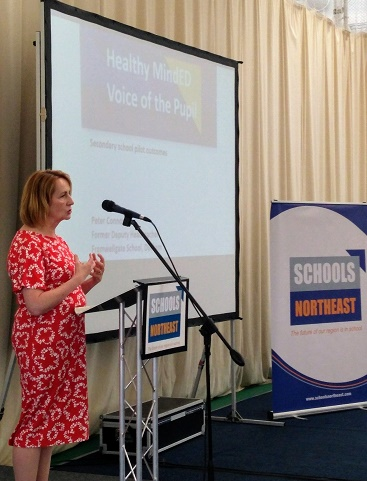Healthy MindED Conference showcases ‘Voice of the Pupil’ pilot outcomes
Delegates at yesterday’s Healthy MindED Conference heard from the school leaders involved in the Healthy MindED Commission’s ‘Voice of the Pupil’ project.
Voice of the Pupil is designed to explore school children’s experiences of mental health through the use of qualitative focus groups in school settings. The findings will then be used to help shape school-based mental health interventions. The study was piloted earlier this year across a small number of primary, secondary and special schools in the region.
Delegates were shown short video clips of what the pupils had to say and given analysis of the emerging themes, which included:
At Primary level:
- There was very little understanding of the term ‘mental health’: “Erm…is it a gym term? Like I was going to say protein shakes.” “Eating healthy, drinking water to keep your brain working?”
- The children felt less important when they were unable to help others, when their autonomy was restricted and when the attention of their family and friends was withdrawn, e.g. when they felt attention was given to siblings at their expense.
- Feelings of being valued, self-determination, having the attention of friends and family, and hobbies are sources of security, support and happiness.
- Accessing the curriculum and being able to achieve seemed to be a consistent theme affecting pupils’ mental health. Worries about guilt, selfishness and illness/death in their families also came through strongly.

Above: Colin Lofthouse, Head Teacher at Rickleton Primary School
At Secondary level:
- Pupils acknowledged there are some worrying issues around social media yet they saw it as just another part of their lives, like homework, that needed to be managed. They wanted it to be normalised, not demonised.
- There was an awareness of the importance of mental health, but a lack of any precise definition of what it meant or an understanding of how it might relate to their everyday experiences.
- There was some awareness of the importance of physical health, such as adequate sleep, in maintaining a positive mind-set.
- Strong feelings of guilt and shame emerged from feeling they had let down friends and family, for example when a friend was bullied and they had failed to stand up for them.
- The pressures of school life, homework and tests were, unsurprisingly, cited as sources of anxiety.
- As with primary age children, hobbies and friends were seen as key sources of emotional support.

Above: Sue Baillie, Pastoral Director at Royal Grammar School, Newcastle
Dr Sue Fisher, Executive Head Teacher at Percy Hedley school, also gave advice on how children with additional needs could be included in the study going forward.
Dr Peter Mulholland, a senior Educational Psychologist and Chair of the Voice of the Pupil working group, concluded by saying that the framework of questions, adapted from the World Health Organization’s definition of mental health, can be successfully used with children of primary and secondary school age; and for those with a variety of additional needs.
He said that the process of engaging pupils is enjoyable for them and is resulting in some very useful insights and learning. This activity will significantly strengthen the ability of the Healthy MindED Commission to report on its areas of interest; but also crucially the ability of participating schools to develop their own capacities to think about and respond to mental health needs.
To register interest in the project or find out more please e-mail c.hawkins@schoolsnortheast.com